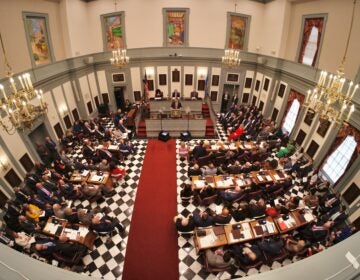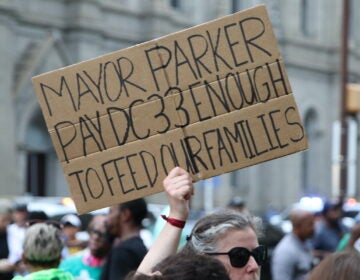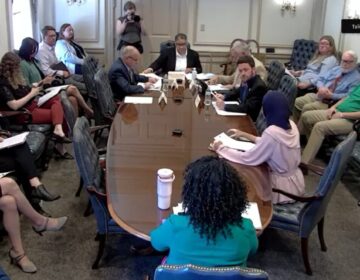How misleading was edit of NPR sting video?
Update, Monday, March 14: Reports coming out over the weekend and today indicate that conservative activist James O’Keefe may have done a selective and somewhat misleading job of editing the full tape of his undercover associates’ lunchtime conversation with former NPR fund-raiser Ron Schiller. Here’s the NPR report. Here’s David Weigel’s take on Slate.
So this raises the question of whether Ron Schiller is another Shirley Sherrod, a person victimized by tendentious editing of a videotape by someone with an ideological grudge. Sherrod is the Agriculture Department official who was briefly fired, before being apologized to and reinstated, after Breitbart.com posted a misleading video snippet that made it seem she had admitted to letting racist feelings influence how she did her job.
So in pouncing on Schiller as I did in this blog post did I commit the same journalistic crime of jumping to conclusions of which I accused others in the Sherrod incident?
It’s a plausible point. I should have made the caveat that, without seeing the full, original tape, it’s dangerous to reach sweeping conclusions.
But I don’t think the situations are quite the same.
Even in context, Schiller seems to be recklessly sharing political views that could undermine the credibility of his journalistic organization, and does so in public conversation with people whom he’d just met and had failed to vet properly as any development professional should. It’s a bad performance.
But people who have watched the full tape say Schiller does do a heck of a lot more to point out the firewall between his fund-raising operation at the NPR Foundation and the journalists in its newsroom than you ever would have known from O’Keefe’s original edit.
That’s comforting – not that it will be much remembered as some people try to exploit this sorry episode to cut funding for public media.
Which was likely the goal of the sting all along.
Original post here:
When someone in an organization with which you are in some way affiliated does something breathtakingly dumb and offensive, you feel a definite tug to talk about it publicly.
You also hear a contrary inner voice saying, “Don’t do it, bozo; that way lies only trouble and pain.”
Well, I’ve long been a bozo.
So at the risk of piling on, let me just say that the stuff National Public Radio’s former chief fund-raising honcho, Ron Schiller, said into the hidden video camera of conservative gotcha artist James O’Keefe was not just dumb.
It was also wrong-headed.
His fault was not just ill-advisedly saying what he thought to a couple of strangers. Even worse was the ill-informed, stereotypical cast of what he thought.
Schiller, among other idiocies, suggested on tape that all members of the Tea Party are “seriously racist.” Some people now rolling their eyes at Schiller’s blunder may still secretly agree with some of the things he said in his lunchtime ramblings. To them his sin is being stupid enough to say those things out loud, in public, to people he just met and hadn’t vetted.
I’d go further. It’s a stupid and grievous generalization to tar with such an epithet all members of a diverse, grassroots organization full of patriotic people.
Are there elements of the Tea Party whose protests seem to be tinged with a special rancor for Barack Obama because he’s black? Seems to me there’s evidence of that. But the evidence also points to a lot, lot more going on inside the Tea Party phenomenon than just that.
I don’t know whether Ron Schiller has ever actually talked to people who describe themselves as sympathetic to the Tea Party. I have. And I found those folks to be decent, sincere people who have some understandable reasons for their concerns, and have an admirable respect for the notion that a nation founded on principles should pay attention to those principles.
Now, I don’t agree with the Tea Party’s interpretation of our founding principles on a lot of points, and I often don’t agree with how they apply constitutional reasoning to modern-day issues.
But I respect the sincerity and patriotism that motivate them. It takes all kinds to make a republic, from crunchy Greens to flag-waving Tea Partiers. And America is far stronger when we gladly welcome multiple views and multiple mores into the sacred circle known as fellow citizens.
Ron Schiller’s ramblings do not reflect the journalistic goals or practices of NPR, a fine organization he was with for a very short time – and not as a journalist. The most accurate way to look at the tape is: “Here I am watching the kind of dance a desperate fund-raiser in a difficult climate does when someone waves a $5 million check in front of his nose.”
Still, it’s good Schiller’s no longer at NPR; it’s also right that Vivian Schiller (no relation) was ousted from the organization’s top spot.
She brought Ron Schiller in as chief fund-raiser, to much fanfare. So she has to take the hit when he turns out to have shown extraordinarily bad judgment.
As usually is the case with turmoil in a large organization, there’s more going on with Vivian Schiller’s ouster than just this incident.
Public media are a confusing alphabet soup.
NPR is a distinct entity from local stations such as WHYY – though some stations have representatives on the NPR board, and go by the moniker of “member stations.”
We are not “part” of NPR; we buy content from NPR, and sometimes contribute content to it. But none of us here worked for Schiller or NPR. The fact is many local station managers disliked an NPR leadership they found to be indifferent to their needs.
Let me make a final point, maybe the most important to the larger controversy raging over what public media, NPR included, contribute to the society:
Ron Schiller’s gaffe does not “prove” that NPR’s journalists are not objective. First, as noted, he was not a journalist. He was a fund-raiser.
But let me make it even simpler: No journalists are objective, IF by that you mean superhumanly immune to bias, preconception and emotion.
Journalists, as flesh-and blood beings, are not objective, in that sense. What we try to be are people who work very hard to know exactly what our biases, preconceptions and emotions are around any issue. We then try to exercise a hard-won discipline of craft to keep those factors from spoiling the work we do. On our good days, our work is objective – even if as human beings we can only aspire to be.
The more open and honest we are about our views and biases (I believe, anyway, much to the exasperation of some of my colleagues in the craft), the more easily the public can judge the accuracy, fairness and quality of the work we produce.
WHYY is your source for fact-based, in-depth journalism and information. As a nonprofit organization, we rely on financial support from readers like you. Please give today.




